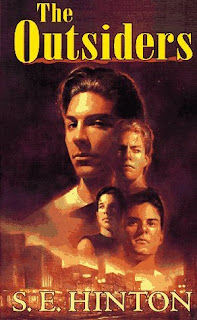 From Goodreads.com
From Goodreads.comAccording to Ponyboy, there are two kinds of people in the world: greasers and socs. A soc (short for "social") has money, can get away with just about anything, and has an attitude longer than a limousine. A greaser, on the other hand, always lives on the outside and has to watch his back. Ponyboy is a greaser, and he's always been proud of it, even willing to rumble against a gang socs for the sake of his fellow greasers--until one night when his friend Johnny kills a soc. The murder gets under Ponyboy's skin, causing his bifurcated world to crumble and teaching him that pain feels the same whether a soc or a greaser.
I was required to read The Outsiders in seventh grade. For me, already a bookworm, it was no problem. At the time I mostly read R.L. Stine books and this was something completely different. My only problem was trying not to read ahead (which I failed at.) Since seventh grade I have read this countless times. I haven't tired of it and I don't think that I ever will. I have so many post-it notes in my copy it borders on ridiculous. Why?
I don't know what made me fall so hard when I was 12 years old. Maybe it was Ponyboy's daydreamer thoughts, getting lost in books and sunsets, when the life he had wasn't quite everything he wished it would be. He's different from everyone around him, not quite fitting in.
As I've gotten older The Outsiders has only sunk deeper into my soul. If you're looking for a love story, there isn't one here, at least not your typical romantic love story. This is a book about the love of family, about friendship.
I recommend this book to everyone. Seriously, everyone. It may have been required reading for you in school as well, and if it was I urge you to read this again as an adult. If you've never read it, I don't think it's ever too late to fall in love with The Outsiders.









